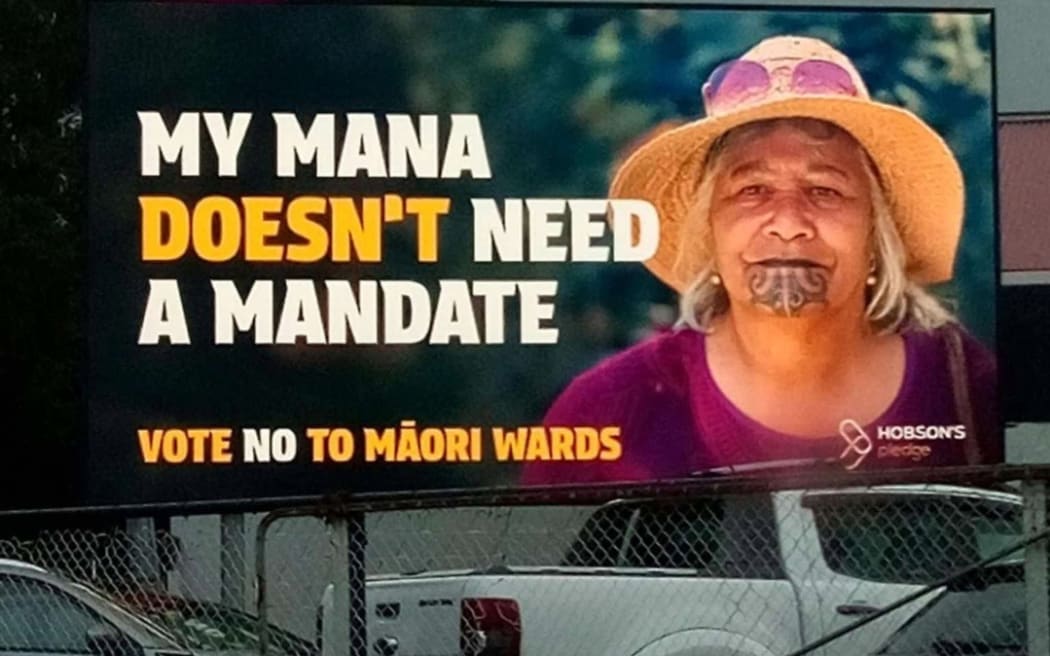Politics
Rotorua Kuia Unwittingly Featured in Anti-Māori Ward Campaign

A Rotorua kuia has expressed her shock after discovering that her image was used in a campaign against Māori wards without her consent. The billboards, featuring Ellen Tamati, display the message, “My mana doesn’t need a mandate – vote no to Māori wards,” falsely implying that these are her words. Tamati learned of this use from her mokopuna at 1:40 a.m. on Wednesday and subsequently spoke to Aukaha News about her devastation, stating, “I’m lost for words, that’s not me, that is not me.”
The billboards, which have appeared across various locations in New Zealand, including Rotorua, Hamilton, Whangarei, and Christchurch, feature Tamati’s face, a Māori woman adorned with a moko kauae. This traditional facial tattoo holds deep cultural significance, as Tamati explained, “This carries everything.” Her granddaughter, Anahera Parata, expressed anger and sadness over the misuse of her grandmother’s image. “All my life, I have only ever known Nan to be pro Māori,” she said. Parata emphasized the pain this situation has caused their iwi, stating, “I can’t imagine being Nan having to face our iwi when her face is being plastered over billboards supporting a message that none of us believe in.”
As of 10:45 a.m. on Wednesday, the Advertising Standards Authority had received over 30 complaints regarding this controversial campaign. The image used on the billboard was taken on Waitangi Day by photographer Rafael Ben Ari, who operates under the name ChameleonsEye. The photograph was purchased from an online stock photo service, iStock, under the label “Mature adult Maori woman with Ta moko tattoo stock photo.”
The leader of Hobson’s Pledge, Don Brash, stated that they believed it was “fair to use” the image and that all necessary rights for public use had been secured. He acknowledged that Tamati had not given consent for her image to be used in this context. Brash elaborated, saying the campaign aimed to foster discussion about democratic fairness and equal voting rights for all New Zealanders, while expressing regret for any distress caused by the billboard.
In response to the backlash, Brash noted that the group has instructed the removal of the billboards. “I think it is taking place, may have already taken place,” he said, confirming that they would cease using the image in future materials. He also mentioned plans to engage with Māori individuals who oppose the Māori wards in future campaigns. “We haven’t asked them to be on billboards to be honest, but that may be the next step,” Brash added.
Tamati remains firm in her stance, urging Hobson’s Pledge to reach out to her directly. “Come and see me,” she said, but added, “the damage has been done.” This incident has sparked a broader conversation about representation and consent in political campaigns, highlighting the importance of respecting cultural symbols and identities.
-

 World4 months ago
World4 months agoTest Your Knowledge: Take the Herald’s Afternoon Quiz Today
-

 Sports4 months ago
Sports4 months agoPM Faces Backlash from Fans During Netball Trophy Ceremony
-

 Lifestyle4 months ago
Lifestyle4 months agoDunedin Designers Win Top Award at Hokonui Fashion Event
-

 Entertainment4 months ago
Entertainment4 months agoExperience the Excitement of ‘Chief of War’ in Oʻahu
-

 Sports4 months ago
Sports4 months agoLiam Lawson Launches New Era for Racing Bulls with Strong Start
-

 World5 months ago
World5 months agoCoalition Forms to Preserve Māori Wards in Hawke’s Bay
-

 Lifestyle4 months ago
Lifestyle4 months agoDisney Fan Reveals Dress Code Tips for Park Visitors
-

 Health4 months ago
Health4 months agoWalking Faster Offers Major Health Benefits for Older Adults
-

 Politics4 months ago
Politics4 months agoScots Rally with Humor and Music to Protest Trump’s Visit
-

 Top Stories5 months ago
Top Stories5 months agoUK and India Finalize Trade Deal to Boost Economic Ties
-

 Health2 months ago
Health2 months agoRadio Host Jay-Jay Feeney’s Partner Secures Visa to Stay in NZ
-

 World5 months ago
World5 months agoHuntly Begins Water Pipe Flushing to Resolve Brown Water Issue









